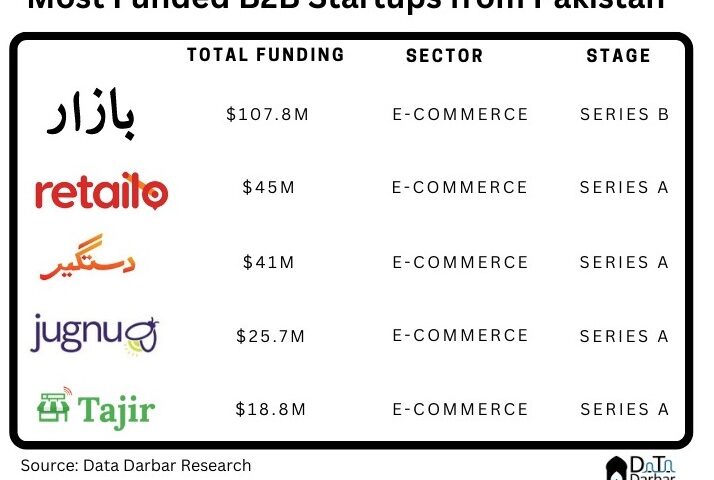Pakistan’s startup ecosystem has had a pretty rough week. First, the news of Medznmore shutting down broke out and then shortly after, Jugnu announced ceasing its core operations. This gave the local industry a new talking point as everyone did overtime with their opinions on Twitter and LinkedIn.
What really added fire to the situation was a news article claiming that Jugnu was burning money extravagantly and had inventory losses of 10-15%, according to a former employee. Scandalous as it was, the piece had quite a few problems, including that the source in question hadn’t worked at the company in over a year. Regardless of the facts, it gave an opportunity to the skeptics, nay dismissers, to write off the ecosystem.
Allegations of embezzlement were aplenty without any evidence to back it up. Which, by the way, haven’t really been retracted even though the publication edited the article. It was the ecosystem’s own version of cancel culture. There were even calls for investigations as to why the companies, that had raised fortunes, were still going bust in impressively short durations. Such arguments were based on the premise that failure is somehow synonymous with fraud, which is preposterous to say the least. All over the world, businesses fail without mud being thrown on everyone’s personal characters. But here, we prefer more exciting explanations and a little bit of scandal.
It also exhibits a lack of understanding of investor expectations who, for better or worse, seem prepared for such shutdowns. Or at least are able to put a brave face publicly. In any case, they knowingly got into the game and signed up for the level of risk involved.
On the other hand, you had the ecosystem’s champions who were rightly distinguishing between fraud and failure. However, this debate didn’t stay there. It soon became more of a startup versus media feud, with founders and investors alike talking about the lack of responsible and research-driven journalism. Threads were written on how the press is to be blamed for this culture of only covering fundraises and shutdowns, and nothing in between.
As the founder of a young data-cum-media company, who has worked both in legacy press and a startup, this topic is understandably close to home. One that I have a lot of thoughts about. So after a few days of staying quiet, I can no longer resist the urge to rant. It will be strongly opinionated, and many will probably disagree. But anyways.
Media and businesses have long shared a complicated relationship: one of mistrust, scorn and mutual dependency. The former relies on ad revenues from the latter, which in turn seeks preferential coverage. However, with the big tech’s continuous rise, the balance of power has somewhat changed, as have the perceptions and expectations.
Anytime something remotely non-promotional appears, businesses tend to have a problem. Especially the new ones where marketing people lead the PR departments and expect journalists to bow down to their petty dollars. Press becomes a convenient scapegoat for everything wrong, from sensationalism to being against progress and national interest even. Granted, it was certainly a factually incorrect story that triggered the debate this time but it is reflective of that deep-rooted antagonism.
This feels quite funny to me because even when the ecosystem undergoes turmoil, founders and investors are still more concerned about the media’s role and not willing to take any accountability: either of not being able to execute it right, picking the wrong model, or at the very least, misjudging the macros. Pretending the events were unforeseen is fooling yourselves. Simply blaming everything on the economic uncertainty feels like a very easy copout.
Now of course, such a pessimistic attitude is not how you build a business. And entrepreneurship, for better or worse, requires a certain optimism and self belief that your bet will work out. It’s supposed to be risky and even reckless in a way. Two years back, there was a unique opportunity to raise capital that was previously unimaginable in Pakistan. So understandably, those who could took the opportunity. From their perspective, leaving that cash on the table would have been worse than trying and failing, which is fair. The only difference is that we tend to nitpick when it comes to others’ stupid ventures while being hopelessly dreamy about our own. But that’s probably not just limited to startups.
In this regard, investors should have been more prudent but they too gave in to the fomo rather easily. All that VC speak of the virtues of asset-light and high margin businesses was abandoned as everyone rushed to put money in companies with questionable unit economics. But well, such is the nature of markets. During good times, they make things seem better than they actually are and in bad times, they make things look worse than they actually are. However, while they oscillated between the two extremes, the same people now blame the media for only doing two types of stories: fundraises and shutdowns.
First of all, it completely ignores the fact that newsworthiness determines press coverage. And at the moment, hardly any startup has anything substantial otherwise to offer. I say that as someone who profiled 125 unique startups — many of whom raised big rounds afterwards — between 2018 and 2020. The only reason it was possible to do that was because my editor, Khurram Husain, had gotten a space in the paper dedicated for startups and backed me to write that column. Not a single piece would have made it to print if we were actually deciding for the news value.
Secondly, Pakistan hardly has a business media, let alone tech. While there are many reasons for that, the biggest one is that our corporate sector is tiny. Around the world, the financial press generally chases the money — usually public markets but also private equity and venture capital. If the country has barely developed markets, it’s the fault of those industries more than anyone else.
To be fair, the media does deserve the blame for a lot of things, including that particular story. The legacy press is too stuck in the past and seems only concerned with recording events and rinse and repeat op-eds than anything else. Meanwhile, digital is more content than journalism, always in a race to get those quick views and doesn’t really have the time for old fashioned processes and nuances.
But the root cause of the industry’s problems lies on the business side, not the editorial. When journalists with decades of experience earn barely over a minimum wage, then it’s pretty stupid to expect quality reporting. And let’s be honest: the market for good research is like 10 people. No one else gives a shit, least of all the startup ecosystem. Some of them spent the last two years building their entire thesis around three data points: population, smartphone and broadband users. But when it comes to journalism, everyone wants deep dives.
This sounds even funnier considering Pakistani startups in particular have themselves enabled sensationalist and clickbaity outlets. All because those guys publish every single crap for a very reasonable price. And that’s what the local tech companies usually want: fluff. In fact, they thrive on it.
Remember the capital frenzy days when the PRs willingly misled people about users by sharing the number of downloads? There was plenty of other wizardry too: like one company talked about the “annualized recorded bookkeeping transactions”. Imagine boasting about an accounting entry as a metric and multiplying that by 12. If there was ever a functioning press, it would have never entertained such stuff. But everyone was apparently cool with it at the time because their own success depended on echoing such fluff, so what if it was bad journalism.
There have also been calls as to why people shouldn’t be hard on startups and founders, because they are ambitious people who are trying to build something from the ground up. Plus, doing business in Pakistan is indeed difficult. Something as basic as opening a bank account is a challenge here. But I, for one, don’t agree with this approach of fishing for sympathy. Admiration, awe and respect? Definitely.
It’s not unique to entrepreneurship though. Other professions have this problem too: the CSS babus want us to feel for their burden, the media for their hardships and let’s not even talk about the constant self-victimization of the boys. Starting a business is a choice, one usually guided by ambition and money. It’s a worthy goal, no doubt, but I don’t see why anyone (including myself) deserves any sympathy for that.
What we often forget is that the decisions entrepreneurs take affect hundreds of lives. It’s not only about business models and unit economics. Experiment all you want but don’t forget that your employees will bear the consequences of that. And unlike founders in Pakistan, staff is not as privileged. With great money comes greater responsibility, but unfortunately those cogs barely ever feature in this whole discussion of risk-taking.





The executives complaining about sensationalist reporting are the same ones backing garbage outlets that copy-paste the work others, knowingly lie, and publish exaggerated flexes without any editorial oversight. Pick a lane – you can’t back garbage and then complain about the existence of garbage.
Also, the mature response to negative press is effective counter comms. Legal action signals weakness in press freedom, hurting the search for critical thinking and diminishing the accountability a country needs.
The VCs crying that the press shouldn’t look into matters that “only concern employees and investors” forget that everyone is made stakeholder when things are looking up, then asked to play the ignorant fool when bad times come knocking. Pick one.
While I concur with everything written above, and thank you for saying it so well, I would want to add some background in relation to the news item you were referring to;
The reporter reached out to both the founders, with all the questions, including those about extra spendings etc. but they opted not to respond. And instead issued a press statement through their socials.
To some friends they even claimed that reporter never approached them, but the reporter has the communication proofs. Khair.
Later on when they clarified, or say responded (thanks to some common friends who intervened) the news item was updated.
I would say, founders should be more open and transparent about failures. I think we should actually celebrate failures, talk about it, let others learn some lessons; but instead we go into dens and would never want to speak about it; leaving room for news stories that could be factually incorrect or say with half truths.
I also want to refer to Airlift, I know people who have been trying to interview the founders since they shut down, without any positive outcome.
Also to point out, it’s definitely between founders and VCs, and that VCs subscribe to the risk, fair enough, but wouldn’t such repetitive failures without much information or say lessons (and a lot of rumors) lead us to lesser amount of investments in future?
The ecosystem itself (local VCs and founders) should discuss the failures, do the shows, podcasts and more for everyone to understand that it’s not the model that were flawed, or the market, or the efforts, and point out to a conclusive reasons that didn’t work.
One last point, founders and startups don’t share any data with media, even when they are operational. When I used to report, I was often denied access to simplest of the data, which could make interesting stories. They tend to guard all the info and would rather work in a very closed environment for reasons that were never comprehensible.
As a Co-Founder of a tech startup (which was bootstraped and has been Profitable), here is my take
1. The media has been guilty of glorifying $$$ raised as the only metric of success. Comparatively there is zero coverage of how good tech companies have made an impact in the areas they worked upon and are generating good revenues, profitable and have also survived during this time.
2. Lets forget news coverage totally. The negative impact of this blitz scaling in a small market which companies like us faced was that instead of going the hardway of coaching the fresh grads, lot of these startups poached upon talent from the stable companies. Again, we were not a cry baby, we explained people you may go for these shining startups, but they will not take a moment to fire you when the funding dries up. We and many other companies like us think of a employee more than just a worker for hire and take our firing decisions solely on merit. This means more accountability for us as Managers of the business which is sorely lacking in all these startups who are getting busted now. If they knew their ships will sink they should have told their employees way ahead. I have seen a norm in many startups that employees get unpaid for months (which needs to be called out).